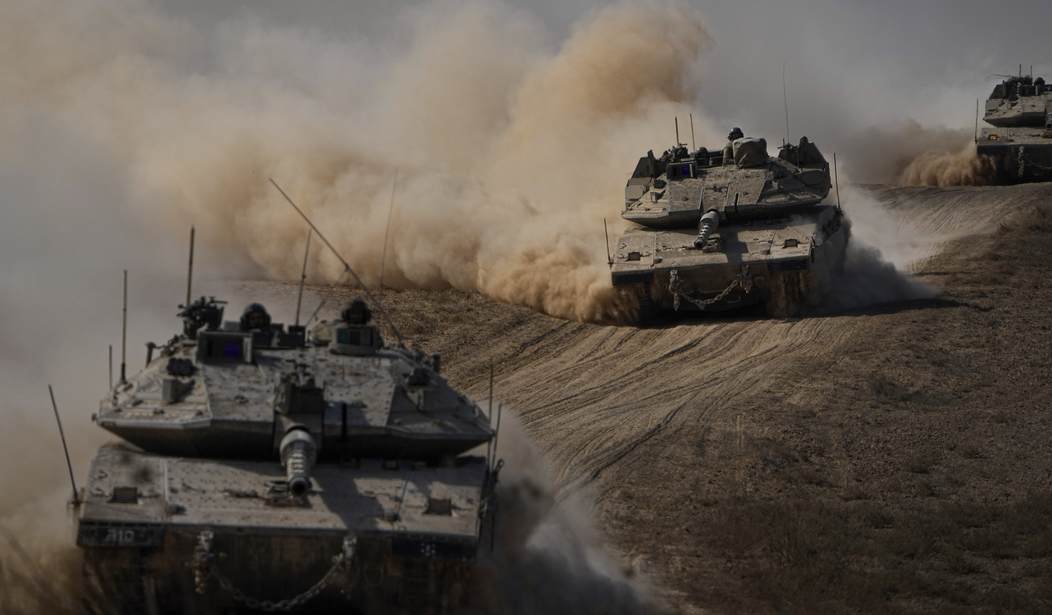Top News
NEW: Israeli troops already in Gaza in search for hostages; clashes increase in the North

Yet another indicator that a large-scale incursion into Gaza is likely just hours away. Israeli ground forces have already penetrated into Gazan territory, conducting “localized raids,” the IDF announced an hour ago. The primary goal is to find the hostages:
According to the military, the troops scanned and collected various findings “that may help in the effort to locate the missing.”
The IDF says the troops also killed a number of terrorists in the area, including a Hamas cell that launched anti-tank guided missiles at Israel.
But that’s not all they’re doing. It may not even be primarily what they’re doing:
IDF spokesman Rear Adm. Daniel Hagari says armored and infantry forces carried out searches and “thwarted anti-tank guided missile squads that intended to infiltrate into Israeli territory.”
“The forces located findings that may help in the effort to locate the missing,” Hagari says.
That sounds more like a reconnaissance in force than a covert search-and-rescue effort. It almost certainly is both, of course, but this is precisely what we’d expect to see before the launch of a major invasion, hostages or no. A proper strategy would have probing efforts to locate the enemy, gather intelligence, and destroy any assets of value to the enemy.
If the IDF has already put troops and armor at risk in these probing missions, it’s only to prepare the battlefield for much larger operations in the near future. It also has morale value in both directions, as successful missions will boost confidence in the ground troops waiting for the order to launch their large-scale invasion. These attacks will also rattle the enemy, and in the case of terrorists rather than military personnel, panic them into movement that can provide opportunities for targeting.
Iran’s proxies know this too. That’s why they’re increasing pressure in the north, with rocket and drone attacks from Lebanon, which Israel has answered in kind:
Israeli forces and Hezbollah terrorists exchanged fire after a blast tore through the separation fence along Israel’s northern border with Lebanon, the IDF confirmed on Friday.
Israeli artillery and tank forces fired at Hezbollah military posts in southern Lebanon while responding to fire from within Lebanese territory. On Friday evening, the IDF said an unmanned aerial vehicle attacked Hezbollah targets within Lebanon. …
Rocket sirens sounded in northern Israel near Safed and east of Haifa earlier on Friday afternoon, with Hamas’s al-Qassam Brigades claiming that it had fired an “Ayyash 250” rocket toward Safed.
The IDF confirmed that one rocket fired from the Gaza Strip was intercepted over Haifa.
Given the circumstances, these seem like relatively weak provocations. If Hezbollah really wanted to force a delay on Israeli action in Gaza, they would need to assemble a large ground force that would force Israel to commit more troops to the north. Of course, Israel has already called up 360,000 reservists to augment its standing army, which means they can fight a two-front war if necessary — and maybe Hezbollah simply doesn’t have the resources to compete against this level of mobilization. That’s clearly what Israel hopes Hezbollah will conclude, but perhaps their Iranian masters will sacrifice them in a vain hope to rescue their other proxy terrorist group in the south.
Speaking of which, Iran is suddenly discovering that their checks may be bouncing:
Iran said Friday the United States “can not renege” on an agreement to transfer $6 billion in frozen funds through mediator Qatar following Hamas’s catastrophic assault on Israeli communities. …
“The US government knows that it can NOT renege on the agreement,” Ali Karimi Magham, spokesperson of Iran’s permanent mission to the United Nations, said late Thursday in a post on X, formerly Twitter.
“The money rightfully belongs to the people of Iran, earmarked for the government of the Islamic Republic of Iran to facilitate the acquisition of all essential requisites for the Iranians,” he added.
I wonder how long Qatar will allow the US to ‘renege’ on this hostage payment. It’s at least long enough to get Tehran’s attention, but they may have larger problems afoot at the moment — such as losing their footprint on southern Israel and any strategic pressure on both Egypt and the Palestinian Authority. Oops.
Read the full article here


















